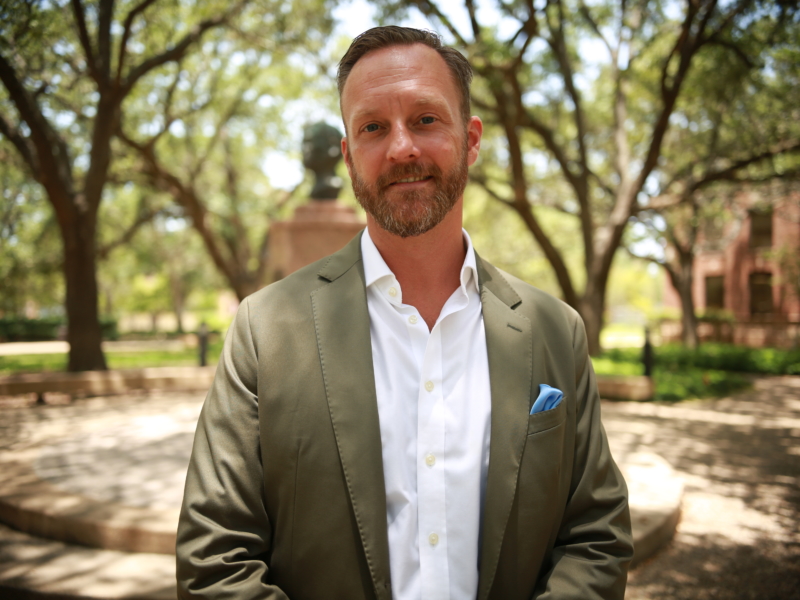Since 2010, Texas has seen more rural hospitals close than has any other state, leaving huge gaps in health care. In Spring 2016, the Texas A&M Rural and Community Health Institute (ARCHI), working with the Episcopal Health Foundation, issued a report titled What’s Next? Practical Suggestions for Rural Communities Facing a Hospital Closure. The idea behind the report was to provide alternatives to traditional hospital care that could help rural patients. Prairie View A&M University (PVAMU) and Waller County have been confronted with this dilemma as the counties population continues to grow. Waller County’s estimated population is 51,307 with a growth rate of 2.50% in the past year according to the most recent United States census data. Waller County is the 64th largest county in Texas.
Summer of 2017, Dr. Mark Tschaepe, Associate Professor of Philosophy was conducting research about HIV testing and treatment accessibility in Waller County and became interested in a wider scope of issues concerning health care in the area. While doing the research, he discovered that Waller County was what he calls a “medical desert” or Health Professional Shortage Area (HPSA). Tschaepe shares, “Talking with people in the area, I was told by many that there used to be hospitals in Waller County: one on campus and one in Hempstead.” To his dismay, the histories of both were fragmentary, especially that of Hempstead, which seemed shrouded in mystery. This sparked his interest in how the area came to be an HPSA and what the experiences and beliefs about health care in the area are among community members now.
With the help of Ms. Phyllis Earles, University Archivist and Ms. Lisa Stafford, Special Collections Librarian in PVAMU archives in the John B. Coleman Library, Michael Zhou, who is a volunteer researcher from Cy-Ranch High School (Cypress) and Christian Farley, PVAMU student in the Undergraduate Medical Academy, has unearthed the histories of the hospital on Prairie View’s main campus and the hospital in Hempstead. Tschaepe and the students are putting together a presentation for submission to the 2019 National Rural Health Association Conference in Atlanta.
Both facilities have intriguing histories. For instance, the original Prairie View hospital, which was opened in the first decade of the 1900s, had to be rebuilt in 1921 in order to accommodate the new College of Nursing, as well as be prepared for epidemics, such as those of malaria and mumps, which had occurred in 1916-17. In total, there were three iterations of the hospital on PV’s main campus. The last was built because the second burned down in 1928. The final iteration of the hospital, constructed in 1929, had 4 wards, an operating room, quarters for nurses, a dental parlor, and a demonstration room. That hospital was open until 1982 when the College of Nursing was moved to the new Texas Medical Center in Houston. Subsequently, the structure was demolished and Delco was built on the site.
Waller County Hospital was opened in Hempstead in 1951. Since its inception, the hospital suffered from a lack of physicians, economic strife, and political battles. In 1975, the hospital briefly lost its Medicare certification because of a backlog of deficiencies. After having its Medicare certification reinstated, they received a grant from the US Department of Health, Education, and Welfare that kept the hospital running until funding ran out in 1977. The hospital struggled for two more years before being leased to Memorial Hermann. Despite the support from Memorial Hermann, the hospital was never able to support itself, and on midnight of February 28, 1985, it officially closed. Since this time, there has been no hospital in Waller County.
With a Faculty Research Development Grant from the Office of Research at Prairie View, Christian Farley is assisting Dr. Tschaepe in collecting data from Waller County residents about health care needs in the area. “Thus far, we have found that around half of the residents we have surveyed believe that primary health care is largely unavailable in the area, and they indicate a lack of proximity and transportation as an issue,” explains Tschaepe. Additionally, research shows that residents have difficulty securing local specialist care, and there are indications that language barriers are also an obstacle to care in the county. The team continues to conduct surveys and plan on extending research in the county to include specific issues of mental health in the fall of 2018.
From Tschaepe’s perspective, the university and county should work together to address health care issues in the area. “Right now, I am assembling a Waller County Health Care Ethics Network on Prairie View’s campus.” Thus far, are over 30 people who are involved, including faculty, students, administrators, outside healthcare consultants, and community members. The first meeting will be in September 2018, and the purpose will be to begin discussing and articulating specific problems regarding healthcare in the county. They will then begin collaborating on research projects and outreach programs. Dr. Tschaepe is proposing a Rural Health Care Research Center for a Chancellor’s Research Initiative grant. This would provide funding for starting a research center on campus that would focus on specific issues concerning health care for rural Texans. “I think there are a great number of opportunities in the area, especially with groups on campus, including the Office of Research, the Small Business Development Center, and the Office of Continuing Education, to name a few.”
Author: Maurice Perkins


